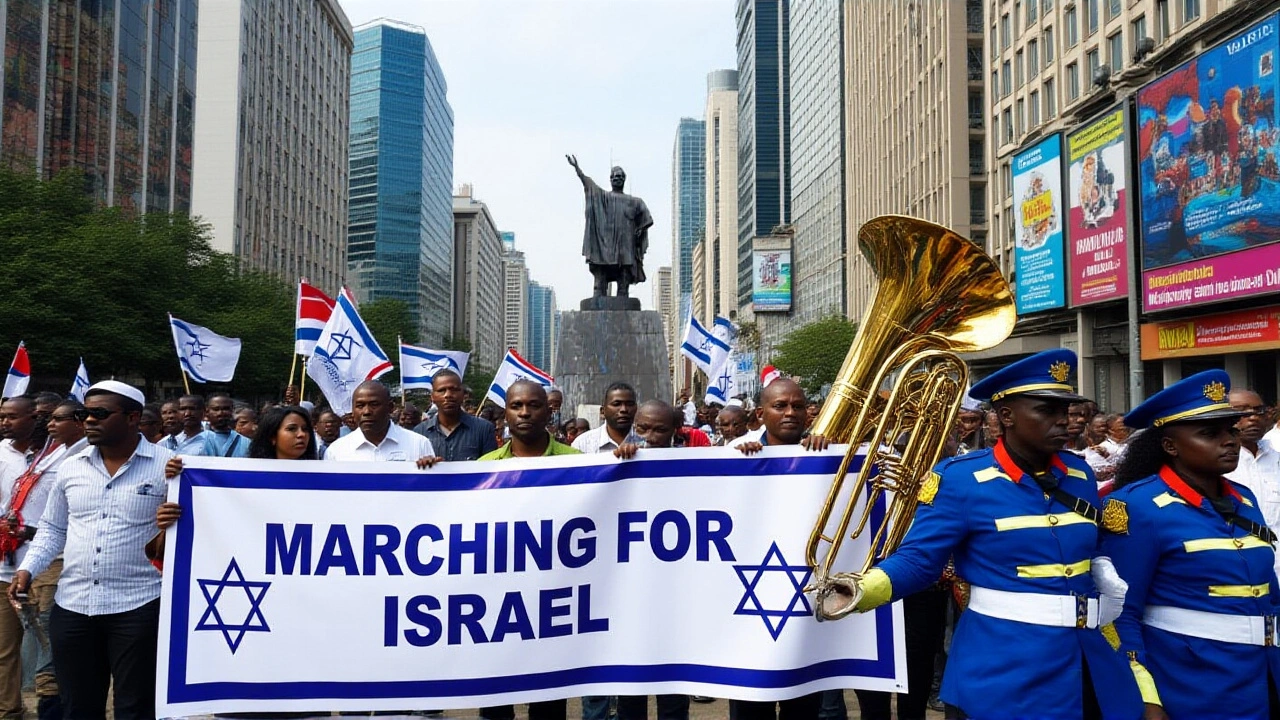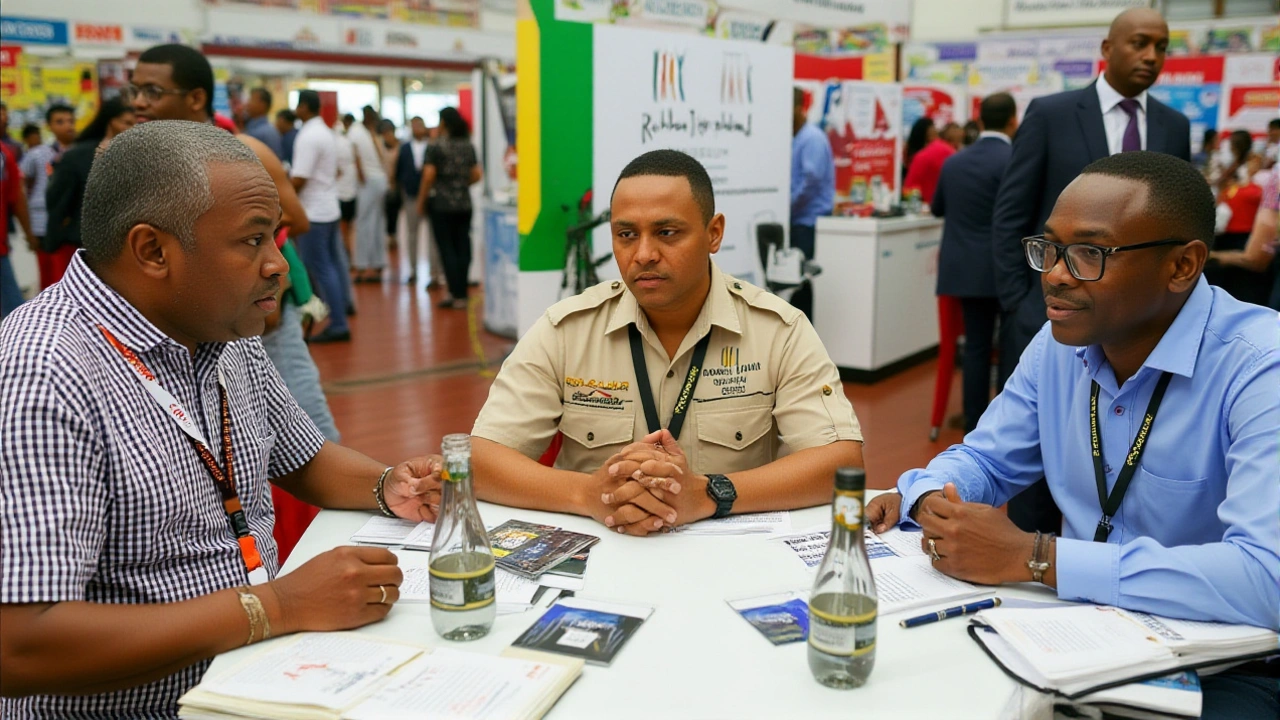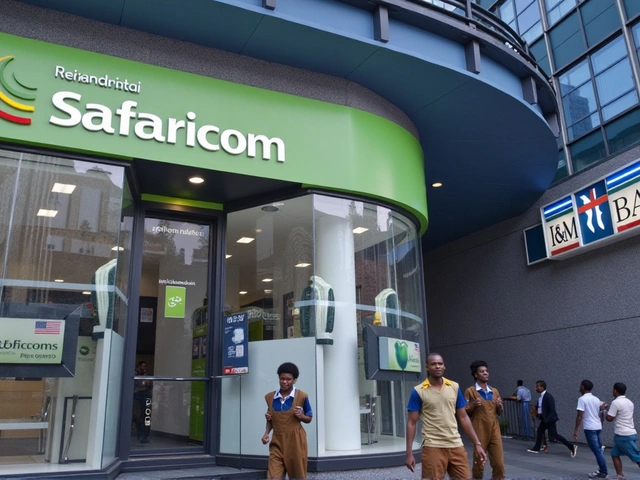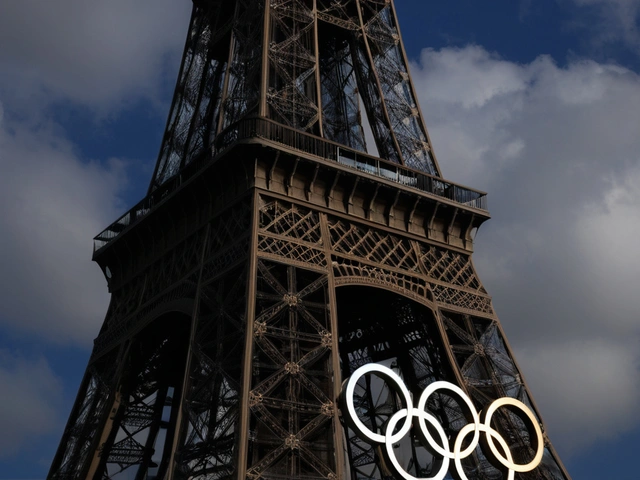When Mazwi, spokesperson for the Robben Island Museum announced a new Pan‑African pricing plan at the Magical Kenya Travel Expo, South African tourism officials set their sights on Kenyan visitors, hoping the historic island and vibrant Cape Town will become the next hot‑ticket attractions.
The expo, held in Nairobi on 15‑17 October 2025, gathered over 300 Kenyan travel agents, corporate event planners and media reps. It was here that Sakhile Ndhlovu, senior manager at the South Africa National Convention Bureau pitched financial and logistical support for Kenyan firms interested in holding conferences, incentive trips and cultural tours in South Africa.
Historical weight behind the marketing push
Robben Island, a UNESCO World Heritage Site perched off the coast of Cape Town, served as a maximum‑security prison during Apartheid, housing Nelson Mandela and other political detainees. The museum’s narrative stresses that “the island stands as a reminder of struggle and triumph,” a line repeated in the expo’s presentation slides.
Two Oceans Travel & Tours reminded visitors in its April 2025 guide that the island’s symbolic value runs deeper than its grim past – it is now a place of reconciliation and learning for the continent.
Pitching Kenyan tourists: the expo experience
At a bustling booth adorned with Table Mountain silhouettes, Mazwi explained that the current entry fee of R600 (about $32) is a barrier for many African travelers. “We are talking about a Pan‑African model that could bring the price down to roughly R300 for visitors from Kenya, Uganda, Tanzania and other neighbouring states,” she said, eyes sparkling.
Ndhlovu, meanwhile, highlighted that South Africa offers more than heritage sites. "From the coastal vineyards of the Western Cape to the game reserves of the Eastern Cape, we have a portfolio that matches any corporate agenda," he noted, handing out brochures featuring the Karoo Lodge at Samara Karoo Reserve.
Pricing strategy and timeline
The proposed pricing model is still in a pilot phase. If approved by the national tourism authority before the end of 2025, the reduced fee could roll out in the high‑season months of September‑October and January‑March – periods that Mazwi identified as "optimal for visiting".
She warned that the island’s winter months, June and July, bring harsh Atlantic swells that often suspend ferry services from the Victoria & Alfred Waterfront.
Crucially, a refurbishment program will shut the island down from 20 June to 31 August 2025, meaning the first wave of discounted tickets will only be available after the summer closure, likely in early September.
Operational constraints and visitor logistics
All tours to Robben Island depart from the Waterfront’s dedicated ferry terminal. During the June‑August works, that terminal will operate a limited schedule, serving only local school groups and essential staff.
Travel agencies were urged to book ahead for September openings, as the post‑refurbishment rush could saturate the daily ferry capacity of 200 passengers.

Broader impact on Kenyan‑South African travel flows
Kenya’s outbound tourism market grew by 12 % in 2024, according to the Kenya Tourism Board, with Europeans still leading the top‑spending segment. South Africa hopes to tap into the rising middle class, whose average disposable income now supports weekend trips abroad.
Industry analysts see the Pan‑African pricing as a “price‑elastic lever” that could boost Kenyan arrivals by an estimated 15 % in 2026, translating to roughly 80,000 extra visitors and an added $150 million in tourism revenue.
Future outlook and next steps
The South Africa National Convention Bureau will host a follow‑up webinar in November 2025, targeting Kenyan DMCs (Destination Management Companies) with case studies of successful business‑travel packages.
Meanwhile, the Kenyan Ministry of Tourism plans to include South African cultural itineraries in its 2026 outbound promotion calendar, aligning with the country’s own “Visit Africa” campaign.
If the pricing model clears regulatory hurdles, travelers could book a combined Cape Town and Johannesburg itinerary for under $1,200, a price point that rivals popular European destinations.
- Key Facts
- Robben Island entry currently R600; proposed Pan‑African rate ~R300.
- Island closed for refurbishment 20 Jun – 31 Aug 2025.
- Optimal visiting months: Sep‑Oct & Jan‑Mar.
- Kenyan outbound tourism +12 % in 2024.
- Projected 15 % rise in Kenyan arrivals to South Africa by 2026.
Frequently Asked Questions
How will the Pan‑African pricing affect Kenyan travelers’ budgets?
If the reduced fee of roughly R300 (about $16) is approved, a round‑trip visit to Robben Island could cost half of today’s price, making a day‑trip from Nairobi to Cape Town far more affordable for middle‑income families.
What are the best months for Kenyan tourists to visit Robben Island?
September‑October and January‑March offer mild weather and calm Atlantic conditions, ensuring regular ferry schedules and comfortable sightseeing.
Will the refurbishment close affect other attractions on Robben Island?
The works focus on the prison museum’s interior and the ferry dock. Outdoor viewing points and the surrounding marine reserve remain accessible, but the full guided tour will resume only after 31 August 2025.
How does South Africa plan to support Kenyan corporate events?
The South Africa National Convention Bureau offers venue subsidies, streamlined visa processes and on‑ground logistics assistance, targeting conferences with 50‑300 delegates.
What other South African attractions are being promoted to Kenyan travelers?
Beyond Robben Island, expo reps highlighted Table Mountain, the Winelands, the Big Five safari reserves in the Eastern Cape, and cultural experiences like the Karoo Lodge’s Cheetah Trail.







Ellen Ross
October 9, 2025 AT 01:47Ah, the grand tapestry of African tourism is a canvas upon which the naive minds of policy makers dabble with crude strokes, believing they can simply adjust a price tag and conjure a flood of travelers; yet they overlook the deep currents of history that bind Robben Island to the soul of the continent.
One might argue that fiscal gestures are mere band-aids on a wound that demands surgical reverence.
Do they not see that the island's walls echo with the whispers of struggle, and that a discount is but a whisper in a storm?
The Pan‑African model, while glittering on paper, may become a hollow echo when the ferry's engines stall in the winter seas.
Moreover, the timing of refurbishment-mid‑year-risks alienating those who seek authenticity over convenience.
In my humble yet undeniably sophisticated estimation, a genuine partnership requires more than token price cuts; it demands cultural empathy, logistical foresight, and a respectful homage to the past.
Thus, let us not be seduced by the siren of cheap entry, but rather chart a course that honors both heritage and hospitality.
Fabian Rademacher
October 13, 2025 AT 16:54They’re obviously using the reduced fee as a smokescreen to funnel Kenyan money into shadow accounts tied to elite South African interests, watch the fine print next time.
Terrell Mack
October 18, 2025 AT 08:01Hey folks, great move on the pricing idea – lower costs can really open doors for more Kenyan students and small businesses to experience Cape Town’s culture.
Just make sure travel agents have clear info on ferry schedules after the refurbishment so everyone can plan smoothly.
Dawn Waller
October 22, 2025 AT 23:07Oh wow, because nothing says “we value you” like slashing a ticket price while the island is closed for renovations – brilliant strategy!?!??!!
Sure, let’s sell dreams of historic tours that won’t happen until September…
Grace Melville
October 27, 2025 AT 13:14Sounds like a win‑win for travelers 😊
Ashlynn Barbery
November 1, 2025 AT 04:21Dear colleagues, the initiative to introduce a Pan‑African pricing structure reflects a commendable commitment to regional integration.
I would encourage the organizing committee to disseminate detailed brochures outlining not only the reduced fees but also the post‑refurbishment itineraries, thereby facilitating seamless coordination for Kenyan tour operators.
Sarah Graham
November 5, 2025 AT 19:27I think this could really help families in Kenya explore our shared history without breaking the bank, and it's nice to see South Africa thinking about accessibility.
Jauregui Genoveva
November 10, 2025 AT 10:34We must remember that tourism isn’t just about profit – it’s about respecting the legacy of those who suffered on Robben Island 💔. Let’s ensure any discount doesn’t cheapen the memory but instead honors it 🌍✊.
Quinten Squires
November 15, 2025 AT 01:41The economics of tourism demand a nuanced understanding of price elasticity demand curves and cross‑border consumer behavior especially in emerging markets where disposable income growth outpaces inflation and where the marginal utility of cultural experiences is significant thus a reduction in entry cost can substantially shift the demand curve upwards providing a multiplier effect on ancillary services such as hospitality transport and local crafts production which in turn stimulates broader economic development without the need for heavy subsidies
Tyler Manning
November 19, 2025 AT 16:47While your articulation of economic theory is appreciated it overlooks the sociopolitical dimension wherein the symbolic significance of Robben Island may render price reduction insufficient to motivate travelers who prioritize authentic narratives over mere cost considerations.
james patel
November 24, 2025 AT 07:54From a strategic market segmentation perspective, leveraging a differential pricing model aligns with the value‑based positioning framework, facilitating a targeted uplift in the high‑potential mid‑tier segment while maintaining brand equity through controlled discount thresholds.
Scarlett Mirage
November 28, 2025 AT 23:01Indeed, the proposal is audacious-bold; visionary-and yet, one must ponder-does it risk commodifying a site of profound historical gravitas?; the balance between accessibility and reverence is delicate; let us tread carefully.
Ian Sepp
December 3, 2025 AT 14:07The timeline for refurbishment appears well‑structured, offering a clear window for post‑release promotional activities.
Lois Parker
December 8, 2025 AT 05:14Looks okay, not much to add.
Lerato Mamaila
December 12, 2025 AT 20:21Robben Island holds a deep resonance across the African continent; by making it more affordable, we invite a shared pilgrimage that strengthens our collective memory and fosters cross‑cultural dialogue-let us celebrate this opportunity.
Dennis Lohmann
December 17, 2025 AT 11:27Great initiative! 😊 Make sure to provide agents with detailed FAQs so they can guide travelers confidently.
Jensen Santillan
December 22, 2025 AT 02:34From a macro‑tourism policy standpoint, the introduction of a Pan‑African fare structure represents a paradigmatic shift in the continent’s approach to intra‑regional mobility, one that seeks to recalibrate the traditional north‑south tourism axis toward a more egalitarian east‑west corridor.
First, the price elasticity implied by a 50 % discount is not merely a statistical artifact but a catalyst for latent demand among Kenya’s burgeoning middle class, who have historically been priced out of heritage experiences due to fiscal constraints.
Second, the temporal alignment of the discount rollout with the post‑refurbishment reopening strategically maximizes exposure to peak visitation windows, thereby enhancing occupancy rates at ancillary venues such as the waterfront restaurants and Cape Town’s boutique hotels.
Third, the operational logistics of ferry capacity-capped at 200 passengers per departure-necessitate a coordinated booking platform, which, if integrated with Kenyan DMCs, could streamline demand aggregation and mitigate overbooking risks.
Moreover, the cultural diplomacy embedded in this initiative cannot be understated; by lowering barriers to a site emblematic of anti‑apartheid struggle, South Africa extends an olive branch of shared heritage that may engender goodwill and reciprocal tourism flows, perhaps even prompting Kenya to reciprocate with comparable concessions for its own historic locales.
Critically, however, the proposal must contend with the specter of overtourism, as a sudden influx of visitors may strain the island’s preservation efforts, necessitating robust visitor management protocols and interpretive programming that preserve the integrity of the narrative.
In addition, the financing model-presumably subsidized by national tourism budgets-should be scrutinized for fiscal sustainability, ensuring that the discount does not become a fiscal black hole that diverts resources from other strategic priorities.
Furthermore, the inclusion of corporate incentive tours adds a layer of economic diversification, leveraging South Africa’s venue subsidies to attract high‑spending delegations whose ancillary expenditures on conferences, gastronomy, and luxury accommodations could offset any revenue shortfall from reduced entry fees.
From an empirical perspective, comparative case studies of similar pricing initiatives in the Caribbean and Southeast Asia reveal mixed outcomes, suggesting that success hinges on complementary marketing campaigns that articulate the unique value proposition of Robben Island beyond its historical significance.
Consequently, the planned November webinar targeting Kenyan DMCs should not merely present data but also showcase narrative‑driven storytelling techniques that resonate with prospective visitors’ desire for authentic, transformative experiences.
Additionally, the policy framework must incorporate mechanisms for real‑time feedback from travelers, enabling adaptive management of ferry schedules, crowd control, and interpretive content to fine‑tune the visitor experience in situ.
Finally, the projected 15 % increase in Kenyan arrivals translates to approximately 80,000 additional tourists, a figure that, while impressive, must be contextualized within broader regional tourism trends to assess its true economic impact.
In sum, the Pan‑African pricing initiative is a bold, multi‑dimensional endeavor that, if executed with strategic foresight, could reshape intra‑African tourism dynamics, foster cultural solidarity, and deliver measurable economic dividends-provided that its implementation remains attuned to both the preservation of heritage and the pragmatics of capacity management.